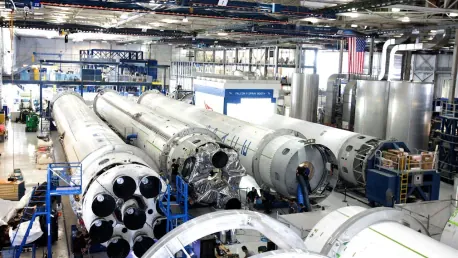Atlas Copco has unveiled its ‘Smart Integrated Assembly’ at the Advanced Engineering show, a transformative approach to aerospace manufacturing that leverages Wi-Fi-connected electric tooling and 5G connectivity. This innovative framework is designed to enhance quality, productivity, and sustainability by reducing material waste and rework. With this initiative, Atlas Copco aims to revolutionize the industry, making manufacturing processes more efficient and eco-friendly.
Smart Integrated Assembly: Enhancing Quality and Productivity
Atlas Copco’s Smart Integrated Assembly framework aims to connect digital tools across a company’s Manufacturing Execution System (MES) using cutting-edge connectivity technologies. This interconnected system not only optimizes production lines by ensuring traceability at every stage but also aims to lower energy consumption through real-time data monitoring. By leveraging hyper-flexibility, manufacturers can make well-informed decisions, transforming their production lines into fully functional Smart Factories that offer significant value to the aerospace industry.
James McAllister, General Manager at Atlas Copco, emphasized the company’s commitment to improving production efficiency and supporting aerospace manufacturers in adopting these cutting-edge solutions. The practical demonstration set to take place on stand J150 at the Advanced Engineering show will showcase how these integrated tools and systems can revolutionize aerospace manufacturing. By showcasing real-time data usage, Atlas Copco highlights how manufacturers can optimize their processes and reduce material waste, ultimately contributing to more sustainable manufacturing practices.
Commitment to Sustainable Manufacturing
One of the primary goals of Atlas Copco’s Smart Integrated Assembly is to foster sustainable manufacturing practices. By reducing material waste and decreasing rework, manufacturers can significantly lower their environmental footprint. This initiative aligns perfectly with the broader aerospace industry’s efforts to move towards more sustainable and eco-friendly operations. The integration of digital tools and real-time data monitoring plays a crucial role in achieving these sustainability goals by minimizing the amount of material waste and unnecessary energy consumption.
The aerospace industry has seen an increasing emphasis on sustainability, with key players making significant strides toward this goal. For instance, Boeing is embarking on a novel aerobraking maneuver with its X-37B spaceplane aimed at improving fuel efficiency, while Airbus has demonstrated advanced manned-unmanned teaming systems in collaboration with various partners. These efforts underscore the importance of innovation and real-time data in improving production efficiency and reducing the industry’s environmental impact. Atlas Copco’s Smart Integrated Assembly provides a promising roadmap for aerospace manufacturers eager to adopt these sustainable practices.
Innovation at the Advanced Engineering Show
The Advanced Engineering show, now in its 15th year, has become a vital hub for showcasing the latest advancements in aerospace and UK manufacturing. Visitors to the show have the opportunity to explore a wide range of technologies and innovations presented by key industry players. This year’s show is no exception, promising comprehensive showcases that highlight significant strides in the aerospace sector.
One particular highlight of the show is the practical demonstration of Atlas Copco’s Smart Integrated Assembly. Attendees can witness firsthand how the integration of digital tools and systems can transform aerospace manufacturing. The exhibit underscores the importance of real-time data and interconnected systems in optimizing production processes and ensuring traceability at every stage. The commitment to sustainability is evident, reflecting the broader shift within the aerospace industry towards eco-friendly practices.
Industry Efforts Towards Sustainability and Innovation
Alongside Atlas Copco’s initiatives, the aerospace sector continues to pursue sustainability and innovation vigorously. The ASG Group is actively working on decarbonization goals, aligning with the industry’s broader push toward more environmentally friendly practices. Such efforts are in line with global trends, as the aerospace industry seeks to minimize its carbon footprint and adopt more sustainable production methods.
Boeing’s novel aerobraking maneuver with the X-37B spaceplane represents a significant step forward in fuel efficiency and sustainability. Similarly, Airbus’s work on advanced manned-unmanned teaming systems demonstrates the potential for innovation to drive sustainability. Through collaborations with various partners, Airbus is exploring new ways to integrate cutting-edge technologies into their manufacturing processes, thus contributing to a more sustainable future for the aerospace industry.
Conclusion: A Brighter, More Sustainable Future
Atlas Copco has introduced its innovative ‘Smart Integrated Assembly’ at the Advanced Engineering show, marking a significant shift in aerospace manufacturing. This new system integrates Wi-Fi-connected electric tools and 5G connectivity to streamline processes. The framework is designed to boost quality, productivity, and sustainability by drastically reducing material waste and the need for rework. The initiative represents Atlas Copco’s commitment to revolutionizing the aerospace industry, making manufacturing more efficient while minimizing the environmental impact.
The ‘Smart Integrated Assembly’ isn’t just about connectivity; it’s about transforming the way manufacturing operations are conducted. By utilizing advanced technologies, Atlas Copco aims to make the assembly process more precise and faster. Improved monitoring and control ensure that tools operate at optimal performance, reducing errors and enhancing overall production quality. This system also aligns with the growing need for sustainable practices, as it significantly cuts down on wasted materials.
In summary, Atlas Copco’s latest innovation promises to set new standards in aerospace manufacturing, delivering a future where efficiency and eco-friendliness go hand in hand.









